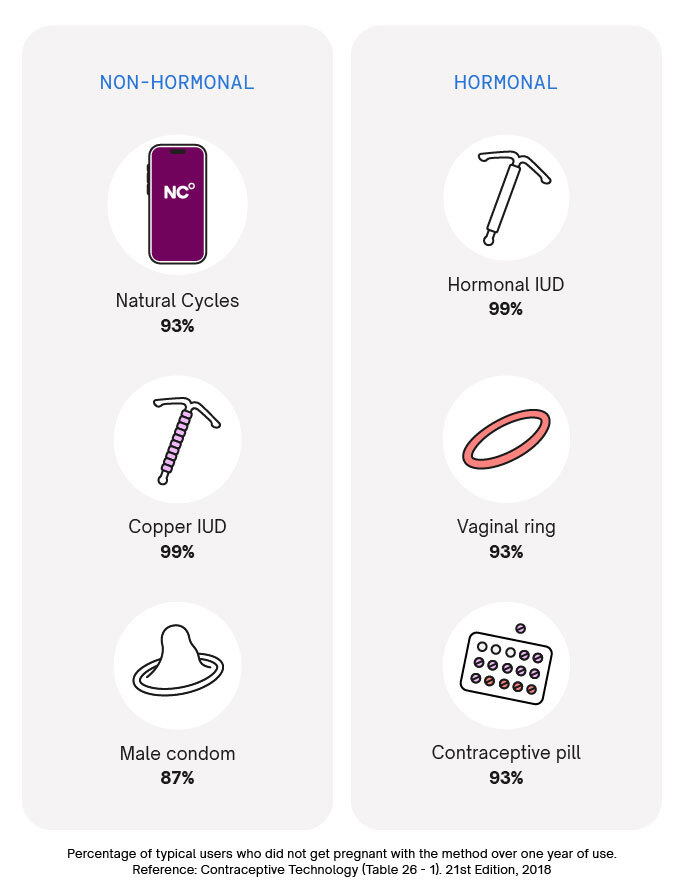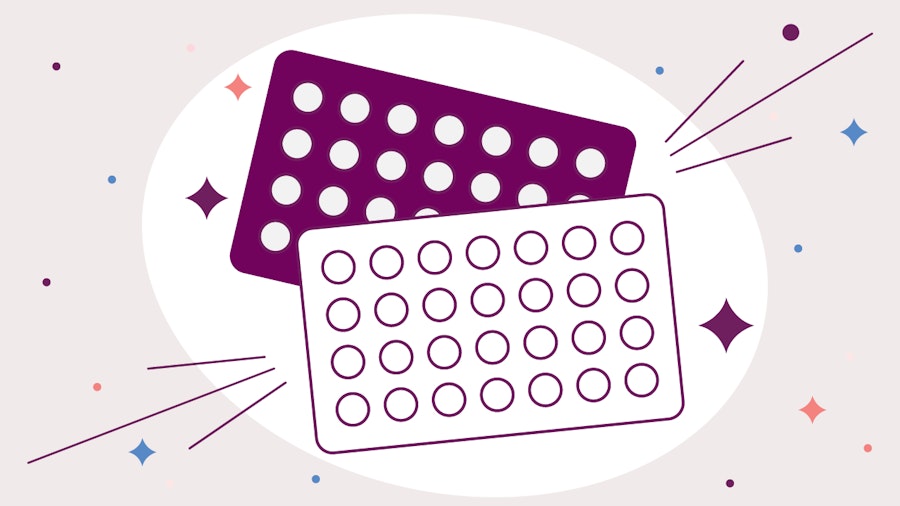How effective is the birth control pill?
- Birth control pills are 93% effective with typical use and >99% effective with perfect use
- Several things can impact the effectiveness of the pill, including missing a pill, taking a pill late, vomiting or diarrhea, or taking certain medications
- To get the most out of your birth control, it’s important to choose a method that fits your lifestyle and that you can reliably use
On this page
- The pill’s effectiveness: typical vs perfect use
- What lowers the birth control pill’s effectiveness?
- What if I forget to take the pill?
- How long do birth control pills take to work?
- How effective is the morning-after pill?
- How to make the pill more effective?
- Alternatives to the birth control pill
- Advantages of birth control pills
- Disadvantages of birth control pills
- Looking for a way to prevent pregnancy hormone-free?
The pill’s effectiveness: typical vs perfect use
When we talk about birth control effectiveness, we talk about both perfect and typical use. Perfect use reflects how a method is intended to be used in an ideal world, whereas typical use reflects how the method is more commonly used. (For example, the occasionally missed pill.)
With perfect use, the birth control pill is more than 99% effective at preventing pregnancy. However, with typical use, the pill it’s 93% effective (meaning 7 out of 100 women in a year taking the birth control pill will get pregnant on average).
What lowers the birth control pill’s effectiveness?
There are several things that can impact how effective the pill is at preventing pregnancy, including:
- Skipping one or more pills
- Forgetting to take the pill at the right time
- Not storing your birth control pills correctly
- Taking medication that interferes with how the pill works
- Vomiting or having diarrhea after taking the pill
What if I forget to take the pill?
This depends on the type of birth control pill you’re taking. If you’re taking the combined pill, you’ll still be protected after one missed pill, just take the pill you missed as soon as you realize it (even if that means taking two pills on the same day). If you’ve missed multiple pills, you may need to use a backup birth control method for a week until you’re protected from pregnancy.
The progestin-only pill is a little more time-sensitive, and you may not be protected if you’re as little as three hours late taking the pill. If this happens, you may need to use a backup method for two days until you’re protected again.
Guidance varies between pill brands, so it’s important to check the leaflet that comes with your specific pill packet. Talk to your doctor or OBGYN if you have any questions or concerns about your specific situation.
How long do birth control pills take to work?
Depending on the type of birth control pill you take and when you start taking it, you will either be protected straight away, or it may take a few days before you’re fully protected. Here’s the guidance for each method:
Combined pills (COCs): If you start taking the pill on your period, you’ll be protected from pregnancy straight away, if you start taking the pill any later than day five of your cycle, then you must take the pill for seven days before you’ll be fully protected.
Progestin-only pills (pops/mini pills): Progestin-only pills are fully effective after you’ve taken them for two consecutive days, no matter where you are in your cycle.
How effective is the morning-after pill?
When it comes to emergency birth control, there are a couple of oral options available. In the US, the two most common types of morning-after pills are Ella and Plan B. Both can be used up to five days after unprotected sex, but the sooner you take them, the more likely they are to be effective.
Plan B is available over-the-counter in most pharmacies, it’s also available to order online. It’s estimated that this emergency birth control method can lower your chances of getting pregnant by 75%-89% if you take it within three days of having unprotected sex.
Ella is only available by prescription, so it may be a little harder to get hold of. Ella is thought to reduce the chances of pregnancy by 85% if you take it within five days of unprotected sex.
How to make the pill more effective?
Looking for ways to get the most out of your birth control pill? Here’s how to protect yourself further:
- Double up your birth control methods: Use condoms or another barrier method of birth control with your pill for extra protection
- Always follow the instructions on the pill packet: It may sound obvious, but it’s a good idea to familiarize yourself with the small print and know exactly what can make the pill less effective as instructions can vary between different brands
- Take emergency birth control if you need to: Accidents happen, if you’ve recently had unprotected sex and are worried, then emergency birth control can be a helpful precaution
Alternatives to the birth control pill
While the birth control pill might be a great choice for some of us, it’s not the best method for everyone. Understanding your birth control options and having a selection of methods to choose from is an important part of making the right decision for your body. Let’s take a look at some alternatives to the pill:
- Intrauterine devices: A type of long-acting reversible contraception, IUDs are highly effective at preventing pregnancy (>99%) and can work for as long as 10 years
- The birth control shot: Administered approximately every three months, the shot is 99% effective with perfect use and 96% effective with typical use
- Vaginal rings: The ring contains a combination of synthetic hormones and is worn inside the vagina for 21 days at a time, it’s 93% effective with typical use and more than 99% effective with perfect use
- The birth control patch: Worn on the skin, the patch needs to be changed once a week, it’s 93% effective with typical use and more than 99% effective with perfect use
- Natural Cycles: The first FDA Cleared birth control app, Natural Cycles is a hormone-free alternative to the pill and is 93% effective with typical use and 98% effective with perfect use
- Condoms: With typical use, condoms are 87% effective and are 98% effective with perfect use, they can be used on their own or in combination with another method and also prevent sexually transmitted infections

Advantages of birth control pills
Many people choose to use the pill for reasons including:
- It’s an effective birth control method: Used as intended, the pill is more than 99% effective at preventing pregnancy, even with typical use the pill is 93% effective
- You can build it into your routine: If you’re a creature of habit, you may find it easy to remember to take the pill each day
- It’s non-invasive: Unlike other popular methods like the IUD, the pill doesn’t sit permanently in your body, you can choose to start or stop using it without a medical procedure
- Can help reduce cycle symptoms: For those who struggle with acne, heavy or painful periods, or other cycle symptoms like low moods, the pill can be helpful in reducing these
Disadvantages of birth control pills
There are also a few drawbacks of using birth control pills, such as:
- Side effects: One commonly cited drawback of the pill is its long list of side effects, including headaches, breast tenderness, and mood changes
- It doesn’t protect against STIs: It’s important to use a condom as well as using the pill if you want to prevent sexually transmitted infections
- It requires consistency and routine: If you think you’ll struggle to take the pill at the same time each day, this may not be the birth control method for you
- There are some serious but rare risks: Both types of the pill have some rare but serious risks attached, including blood clots, stroke, and breast cancer
Looking for a way to prevent pregnancy hormone-free?
It’s important we all have access to a range of birth control options to find the right one that suits our needs. At Natural Cycles, we’ve created the first app of its kind that helps you prevent pregnancy without hormones. NC° Birth Control is a temperature-based method that learns the pattern of your cycle so you can identify your fertile days and choose to abstain from sex or use condoms in that window.
Natural Cycles is another option for those who don’t want to use these hormonal methods like the pill for medical or personal reasons. If you’re thinking about switching to a contraceptive method without hormones, why not find out if Natural Cycles could work for you today?
Did you enjoy reading this article?
